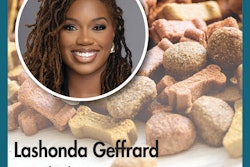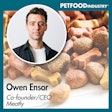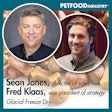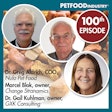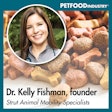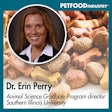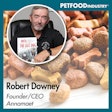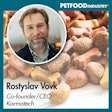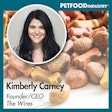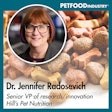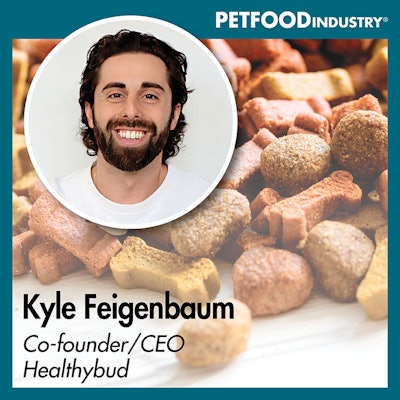
In this episode of Trending: Pet Food, recorded live at Global Pet Expo 2025, host Lindsay Beaton sits down with Kyle Feigenbaum, co-founder and CEO of Healthybud, to explore the current state of superfood ingredients in pet food. Feigenbaum shares insights on how the gap between human and pet food trends has narrowed dramatically, discusses the rise of functional treats that incorporate medicinal mushrooms and prebiotics, and reveals Healthybud's upcoming launch of the first freeze-dried raw food line to include pre- and postbiotics. The conversation covers consumer demand for transparency, the evolution of superfood terminology, and what the future holds for functional ingredients in pet nutrition.
In Episode 91 of Trending: Pet Food, host Lindsay Beaton sits down with Kyle Feigenbaum, co-founder and CEO of Healthybud, to discuss how human-pet food trends now align within months and reveals Healthybud's upcoming freeze-dried raw line with pre- and postbiotics. You can find the episode at Trending: Pet Food Podcast, on SoundCloud or on your favorite podcast platform. This episode originally aired on July 23, 2025.
We want to thank AFB International for sponsoring this podcast. AFB is the premier supplier of palatants to pet food companies worldwide, offering off-the-shelf and custom solutions and services that make pet food treats and supplements taste great.
Lindsay Beaton, editor, Petfood Industry magazine and host, Trending: Pet Food podcast: Hello and welcome to Trending: Pet Food, the industry podcast where we cover all the latest hot topics and trends in pet food. I'm your host and editor of Pet Food Industry magazine, Lindsay Beaton, and I'm here today live on the Global Pet Expo 2025 show floor with Kyle Feigenbaum, co-founder and CEO of Healthybud. Hi Kyle and welcome!
Kyle Feigenbaum, co-founder and CEO of Healthybud: Hi Lindsay. It's a pleasure to be here with you today. Very excited about this chat.
Beaton: In case you're unfamiliar with Kyle or Healthybud, here's what you need to know. As a CFA charter holder with a strong background in finance and business strategy, Kyle blends his expertise in operations with his passion for pet health. Under his leadership, Healthybud has forged partnerships with top retailers across North America and cultivated a devoted community of health-conscious pet parents. His innovative approach to brand building and keen ability to adapt to market trends have positioned Healthybud as a disruptor in the pet wellness industry.
Healthybud is an award-winning pet wellness brand that's reinventing the pet pantry with functional food and treats for dogs, incorporating superfoods to help dogs live longer, happier and healthier lives. All Healthybud products are crafted with a purpose—from supporting digestion to mobility, brain health, anxiety relief and overall wellness.
Kyle's business acumen and leap into the functional pet food and treat spaces brought him on today to answer this question: What is the current state of superfood ingredients in pet food?
Kyle, I want to start off being consumer-focused, and we'll bounce back and forth between what the industry thinks and what you believe consumers think. What do you think are the top reasons people have gravitated toward the idea of superfoods for their pets?
Feigenbaum: Great question. I think we have heard this term called humanization that is played out at this point, right? That's an old term. But what does it really mean? At the end of the day, people are creating bonds with their pets that we've never seen before—very deep bonds—and the way that we are typically changing our diets is now being passed on to our pets a lot faster than ever before.
With consumers changing their mentalities around the foods that they are eating, we've seen many trends in the last five years. A big trend, for example, is medicinal mushrooms. As medicinal mushrooms are starting to be more explored in the human health diet, humans are naturally starting to think, "Wow, now that I'm eating this and I'm seeing the benefits and I'm loving these ingredients in my own life and my own diet, can my best friend benefit from these things too?" That's really why I think superfoods have taken off at this stage. It's because of that natural, inquisitive mentality that the consumer has.
Beaton: It used to be that it took years for a trend to hop from the human space to the pet space. It's well known that it does, but it used to take quite a while. It's known that that has been accelerating over the years to the point where you can see a trend pop up in the human space, and six months later you see it in the pet space. How are you seeing that in superfood and functional ingredients? Is it a pretty fast hop over?
Feigenbaum: It's insanely fast. We started this business five years ago, and I couldn't agree more with exactly what you just said—that lagging gap has been accelerated incredibly fast. In particular, you can look at all the different functional treats that we put out on the market.
Just to take a step back, Healthybud is a pet wellness brand, and we are very focused on creating functional treats for dogs. We don't want to make the traditional treat with a bunch of unnecessary or crappy ingredients, if you will. We also don't intend to create a supplement. We're falling somewhere in between where we're providing something for the pet parent to incorporate in their dog's lives—amazing ingredients that the pet is going to benefit from over the long term—but none of our products are intended to be a quick-fix solution.
You can look at some of the things that we're doing. I'll use our Joint Booster as an example. In our Joint Booster, you're going to find things like collagen. You're going to find things like green-lipped mussel, which has naturally occurring chondroitin and glucosamine. These are the types of things that humans—maybe they're experiencing joint pain, maybe they're looking for specific ingredients—these are not novel ingredients anymore. A lot of people are taking collagen in their day-to-day life, and this is something that people have already benefited from, have already become accustomed to including in their own diet.
Now, when they're shopping in the local pet store or looking online, and they have the ability to look at the ingredients on the back of our bag, and they see that we're using something like collagen, immediately the light bulb goes off and they say, "Oh, I love this ingredient. I know that this is beneficial, this is great that I can now give it to my dog." I think that's why, because humans have become more accustomed to specific ingredients and because we're more knowledgeable now, we've seen that lagging gap between what is introduced in the human space and what is introduced in the pet space close very fast, because people are accustomed to these ingredients, and they want to see their dogs benefit from it too.
Beaton: You mentioned that you're in an in-between space. You're not a supplement. You're focused more on long-term. You clearly have functional ingredients. Do you feel like pet owners are aware of the differences? Because supplements are becoming a larger part of the category, and I feel like there could be some consumer confusion over whether something is an assistive ingredient versus a supplement that has to have specific levels of things to make the claims. Are you seeing among your particular consumers any confusion there? Or do you feel like everybody has a handle on the differences in the different segments?
Feigenbaum: I think it has to do a lot with how we're categorized. For example, if you go and you find Healthybud on the store shelf, you're not going to find us in the supplement section. If that is happening, that's something that we intend to fix very quickly.
Yes, we do get consumers coming to us sometimes and asking about what is the level of a specific ingredient that you've included, and is that too much or too little? For us, we do have feeding guidelines on the back of our functional treats. The main ingredients inside of all of our functional treats are all natural, there's really no fear of giving too much of a specific ingredient. But we still put it there for consumer knowledge purposes.
I think based on how we're marketing it and really keying in on it as a functional treat and not selling it as a quick-fix supplement—there's always a little bit of confusion, but for the most part, I think we've done a good job of avoiding it.
Beaton: Superfoods has been a word for a while in the pet space and in the human space. I really feel like it happened pretty close to the same time, or at least when I became aware of superfoods, but it clearly means more now than it did at the very start. How have you seen the idea of superfoods evolve in the pet space over the years?
Feigenbaum: I think superfoods is a very general, generic kind of term, and it depends on the specific pain points, if you will, that we're looking at. For example, joint health or gut health, or calming and anxiety. Then which specific superfoods—we even like to say healing ingredients—are included to benefit that specific pain point.
If we're talking about gut health, for example—and again, we don't claim to be a supplement—but our Gut Booster, our customers claim that this is a miracle worker. It does its trick in 24 to 48 hours. We've included the big thing in that: pre- and postbiotics. We have other great things for gut health, like pumpkin seeds and yucca and sweet potato and all the things that you would naturally consider a superfood, and those really are superfoods, and pre- and postbiotics are too.
It's different ways of seeing these foods, including them in a total formulation, and ensuring the consumer understands what it's for and what it's really about. That has been really key for us as we grow Healthybud. This concept of superfoods is something that people are really more interested in and are naturally starting to look for: What is a superfood? What is the superfood gonna do for my dog?
Understanding that this is not something that is novel—a pumpkin seed as an example, that's a superfood. It's nothing that's truly complicated as an ingredient, but because of its very strong benefit, specifically for gut health, by the way, you can consider it a superfood, and it should be a superfood. Once consumers start to understand that superfoods aren't something that is very novel—something that is actually very simple, likely ingredients that they're already consuming themselves—and now understanding that they can introduce that into their dog's diet, that's amazing, right? That's really what we want as pet parents. We want our dogs to live the longest life possible, and we want them while they're living to live the best life possible, and eating healthy and incorporating superfoods—that's a huge part of it.
Beaton: As you think internally about expanding your line, putting out new products? what are the asks? What are people asking for?
Feigenbaum: Solutions to gut health has been huge for us right now. That's a big topic. What we recently did—Lindsay, you're one of the first to hear this, this will go public on your podcast—the products are slated to launch in the summer. We are going to be the first freeze-dried raw brand to incorporate pre- and postbiotics in our food. We just looked at what can we do on that front? We've included things like chicory root, inulin, cultured yeast.
To tell you the truth, we've done some testing on our end, and we've noticed that these ingredients, when you're looking at the fibers in these specific ingredients, they're powerful that we actually had to reduce the amounts that we were using in our food, because we noticed that sometimes when you're starting to include pre- and postbiotics, even as a human, you'll notice this yourself, there's a lot of changes going on in your diet. You might have different timings in your bowel movements. You might have loose stool. It's the same with the dogs.
We really are trying to hit this level that is actually well received by the dog, but also very impactful and beneficial for the dog at the same time. We're very excited about our new line of food that is going to be coming up very soon. The reason why we did it, going back to your question, is because of how hot of a topic gut health has been.
For us, we thought, well, you have all these supplements that are available for gut health. We have our functional treat that's available for gut health. But what if you can just make a really fantastic natural food, no synthetics, clean ingredients from the start, meets AAFCO feeding guidelines, and incorporate the actual fibers that you need for gut health in the food directly? Why do you need to supplement if your food that you're feeding your dog already has everything that you need? That's really that next step that we've been trying to take with this food, and it's just us responding to what consumers are asking for. That's been a really big one when thinking about superfoods and the pain point of gut health itself.
Beaton: Your main lines are treats, and you have since expanded into meals, and now you're going to be launching some new products. What kind of a role in deciding to launch a complete meal with pro- and postbiotics did convenience play? Because on the one hand, pet owners like to feel like they're customizing their meal for their pets, right? That's why treats are big. That's why toppers are big. It's just easy to combine. But on the other hand, they also really want convenience, and there's kind of a split, and it can be the same consumer too. Maybe some nights they want to go all out and some nights they just want to put it in the dish. Is that something that people were asking you for as well, or did you really just want to develop into the meal space?
Feigenbaum: That's a really good question, and now you're getting my mind going. Honestly, we didn't really take that into account. What we were thinking of is, how do we make something that's not necessarily convenient? This is going to be a convenient solution, but also something that's affordable. You don't want to go out and buy your food and then buy your supplements, and supplements can get very expensive. That was one thing that we took into account.
But with all of our product launches, the only way that we will launch a product is if we feel very strongly that the consumer is asking for it. In order to do that, we do a lot of surveying, we will use different tools to get in front of the customers via email, make sure that they're answering questions that we need them to in order to feel confident that we're actually launching products that they want. Even Instagram has been a very useful tool just to do quick Q&As, multiple choice questions and make sure that they're getting what they want from our brand Healthybud.
I think that has been the biggest reason as to why we launched our mini training treats. Today, the functional training treats—that's our best selling product. You alluded to it: we started with treats, we rolled out into food, but ultimately the functional treats, and specifically the functional training treats, that's our bread and butter. Right now, there's not much like it on the market.
We're talking about superfoods here today—the functional training treats are the first training treat to incorporate medicinal mushrooms for brain health. The way we thought about it is, what does it mean to be a functional treat? It means that you're marrying what is the use case of the product with the benefit. The use case is training. Every dog parent wants their training treats to be very small, one calorie per treat, if possible, soft and chewy they can break up and feed easily. But from our perspective, what is the functional benefit? Well, that's focus, right? When you're training your dog, you want your dog to be focused.
Naturally, we're starting to think about cognitive health and brain health, and we're starting to think about medicinal mushrooms, adaptogenic herbs and things that can help improve cognitive health. That's why we've incorporated ingredients like reishi or lion's mane in our training treats.
Beaton: I want to talk a little bit more about the mushrooms, because that is a really hot superfood/functional ingredient right now. At what point did you decide to introduce them to your line, and how did you decide specifically which mushrooms to use and for what purpose?
Feigenbaum: When you're thinking about the world of fungi, it's a massive space, and for us to look at mushrooms as a whole, we really wanted to focus on what we are already incorporating in our day-to-day. My co-founder, my wife, Dana, and I have been introduced to mushrooms, and we have been incorporating mushrooms in our day-to-day for a very long time.
When you look at chaga just as an example, and incorporating chaga as a potential energy booster, and maybe even using it as an alternative to a coffee or a matcha—that's something that we've started doing in a latte or things like this. We've been noticing how powerful mushrooms can actually be. Naturally, we've started looking at the mushrooms that we are already using in our day-to-day.
I come from a spot where gut health is very important to me, because I, for a long time, was suffering from Crohn's disease, and it's in remission, very happy to say. A lot of the things that I incorporated during the time when I was feeling my worst are some of the things that we're using today with Healthybud, and some of that is the medicinal mushrooms. A lot of that is the gut health, which is why I'm passionate about pre- and postbiotics and probiotics too, because I felt a lot of help from these ingredients when I was suffering. I really know firsthand the power of incorporating them in your diet, and that's why I feel very passionate about what we're doing here today.
Beaton: We talk about industry drivers a lot—why people want to start pet companies, why they want to do these things. I want to sidebar a minute, because you clearly have a mission. You have firsthand experience on multiple levels for why you started the company, then you took some things that were helping you with your own health problems and incorporated them for pets.
How important do you think it is to have that kind of internal drive when you're starting a company in a space that is crowded and really needs a differentiating factor? How much of that drive got you started and how much of it still keeps you going and expanding today?
Feigenbaum: It's a really great question. Honestly, it's everything, because when you enter a business—and this is something I feel very passionate about, I talk about business a lot. I talk to universities. I talk to individuals who are dreaming about starting their first company. What I believe is that when you start a business, first off, you got to jump into it two feet. You got to jump in right away and give it your all. The reality is, when you're starting, you're not going to know a lot. There's much to learn.
I started this business coming from a background in finance. I had no idea what I was doing starting a pet company, but I knew what I could be good at, and I knew that, for example, my background is in finance. My wife and co-founder, Dana, her background is in architecture, but she's amazing at branding. She's amazing at marketing. She's also a singer, she's very good at connecting with people. We knew exactly where in the business—I would focus on fundraising, accounting, running the day-to-day operations. She would focus on marketing, branding. We knew all of that.
But I think when we look at where we were five years ago and what we've done today, it has been a series of ups and downs, highs and lows, it has been an unbelievable journey. We've had our really difficult days, and we've had our amazing days, but you know what, I would never want to change those difficult days, because the hardest, most tough times that we've gone through is what has shaped us to what we have become today.
I'm sidetracking on your question a little bit here, but I think going back to passion, if you don't have a passion for what you're doing and a real reason—we call it a raison d'être in French, "a reason for being"—if that is not very core to you, then along the way, when you're hitting these hurdles and when you're hitting these tough times, you're going to throw in the towel, because business is very difficult.
For me, I mean, we can talk about my founding story and origin story, if you like, but because I feel very strongly, and the reasons why I'm actually doing Healthybud, I've fought through the toughest times, and know that my motto now is, "I'm going to climb this hill and get to the top or die trying." That's how I rally my team. We all feel very strongly about what we're building.
We're having the absolute best time doing it. We're trying our best to celebrate the wins, which is easier said than done, but that's why I think really your core values, aligning them with your business and ensuring that you're passionate throughout is extremely important, and that's what keeps you alive and pushing forward.
Beaton: That's amazing. As we wrap things up, I like to be future-focused. Getting back to superfoods, how do you think their use in pet food and pet treats are going to continue to evolve in the next few years and even beyond? What do you see coming down the line?
Feigenbaum: I think that consumers have become much more critical of what they're feeding to their pets. The way I see it is because the consumers—this is how it always works in business, right? The consumers make a specific demand, and the manufacturers and brands are going to try to meet the demand that the consumers are making. Because consumers are now knowledgeable when it comes to superfoods, because they're incorporating them into their own diets, and they're knowledgeable on how the pet food industry is starting to work—there are different types of food manufacturing. We're talking cold-extruded, air-dried, freeze-dried, wet, dehydrated. Consumers know everything now, and that's a big change.
Because the consumers are going to continue to demand innovation, they're going to continue to demand that the brands are doing the best for their dogs, the brands are going to follow suit. They're going to have to—even the big players—and we're going to start to see in this industry a lot shorter, cleaner and more functional ingredient decks than we've ever seen before. That's something that I'm very excited about. I just hope to be one of the players that is leading the way.
Our goal at Healthybud is to be recognized by the modern pet parent. The modern pet parent isn't defined by an age. It's not millennials, it's not Gen Zers, it's not boomers. The modern pet parent is defined specifically by a mentality that the pet parent has, which is wanting to do the best for their pet and treating their pet and feeding their pet in the way that the modern pet consumer is doing today. That's where we want to be the leading player. We want to be that brand—Healthybud—that the modern pet parent is looking to for the next innovative product, for information and for doing right by their dog.
Beaton: Well, I really appreciate you taking the time out of your busy Global Pet Expo 2025 experience to meet with me. Superfoods have been such a staple of pet food for some time now, and functional needs are increasing for pet food formulation, I really wanted to find out how the ingredient space has been evolving to match these trends. Thank you much for being on, and before we go, I always do a little plug for my guest. Where can people find more information about you and Healthybud?
Feigenbaum: Definitely. Healthybud, you can go to our website, healthybud.co. We're also pretty active on social, you can find us on TikTok. You can find us on Instagram. Our Instagram handle is healthybud_co.
If you want to follow me personally, we did touch on business today. I do a lot more stuff in the business realm, specifically speaking to young founders and aspiring founders. You can find me on TikTok. It's Kyle Feigenbaum on TikTok, or kfeigenbaum is my handle. You can see what I'm doing over there, just getting started. Bear with me, but it's going to be a fun journey. We'd love for whoever's listening today to hop on board and follow along on TikTok.
Beaton: Perfect. That's it for this episode of Trending: Pet Food. You can find us on Petfood Industry, SoundCloud or your favorite podcast platform. You can also follow us on Instagram @trendingpetfoodpodcast. If you want to chat or have any feedback I'd love to hear from you, feel free to drop me an email [email protected].
Of course, thanks again to our sponsor, AFB International, the premier supplier of palatants to pet food companies worldwide, offering off-the-shelf and custom solutions and services that make pet food, treats and supplements taste great.
Once again, I'm Lindsay Beaton, your host and editor of Petfood Industry magazine, and we'll talk to you next time. Thanks for tuning in!

